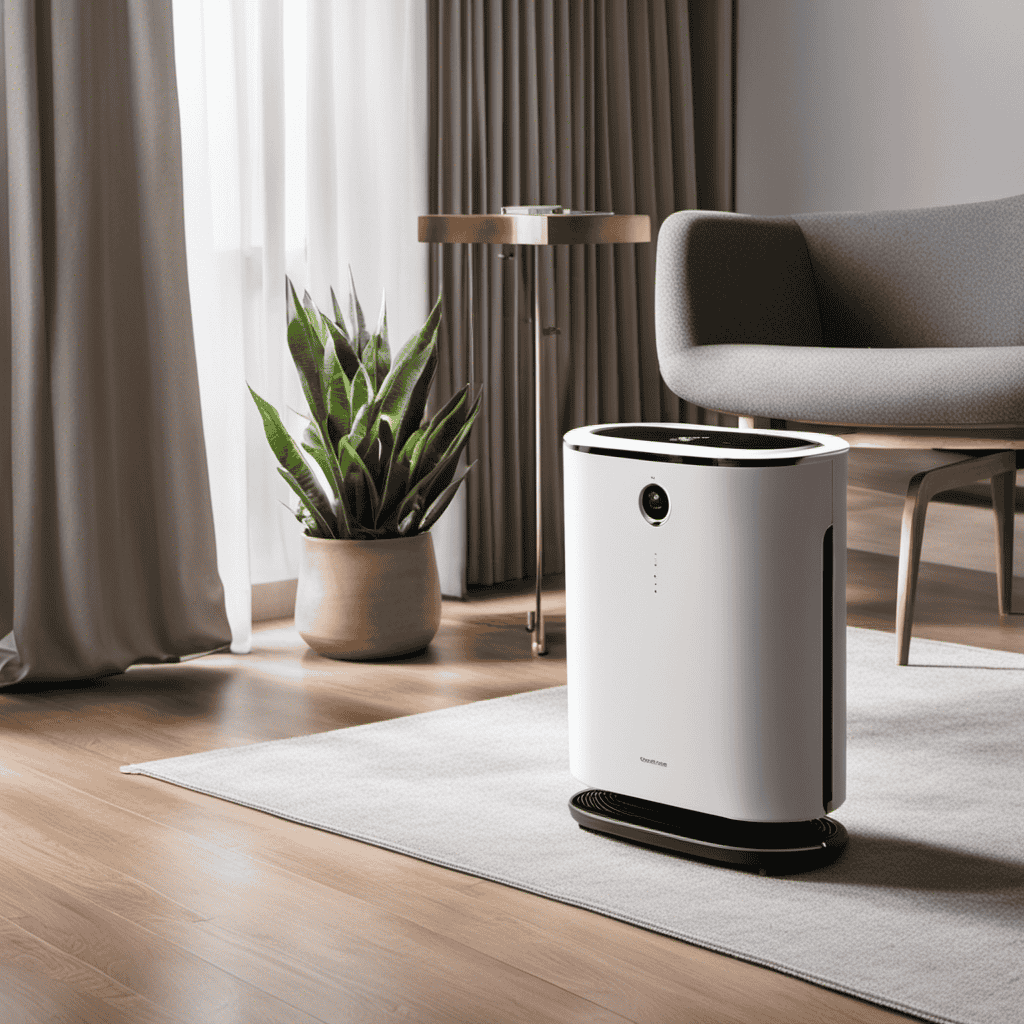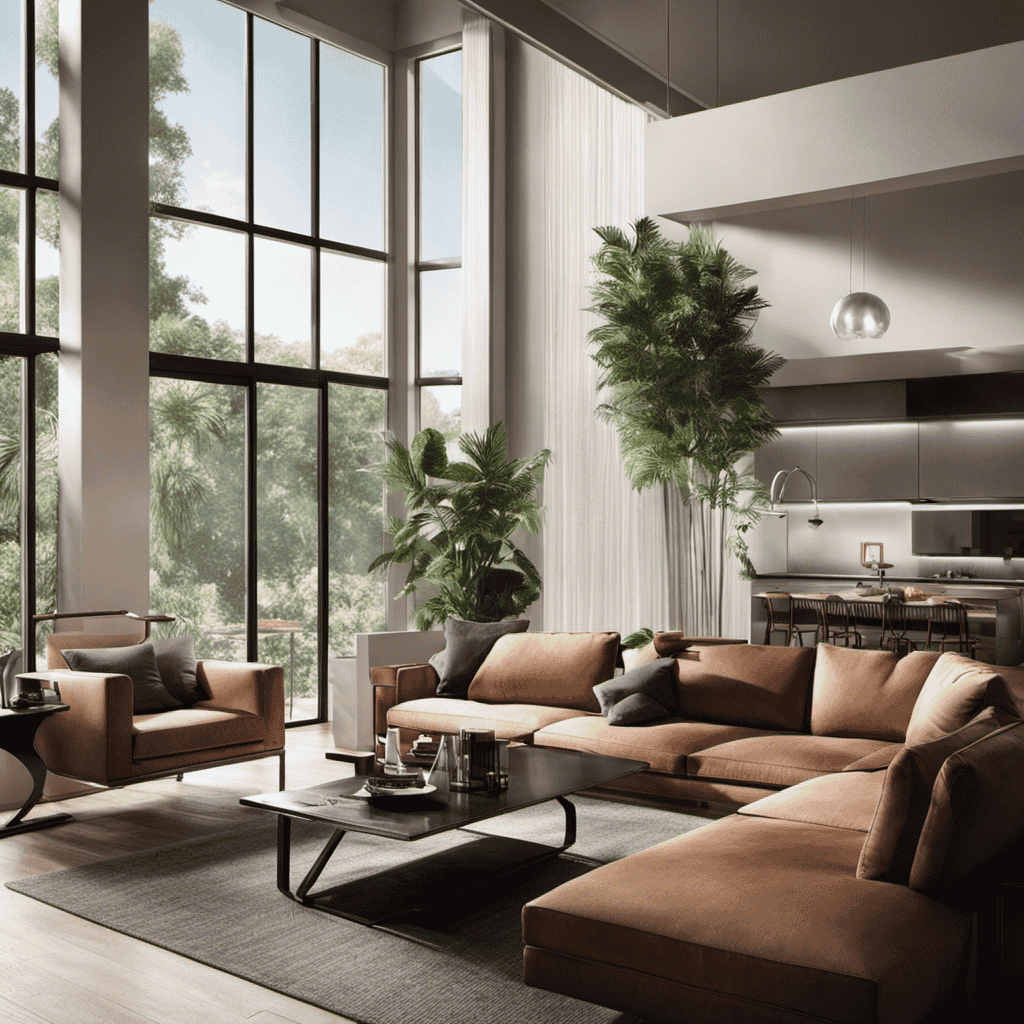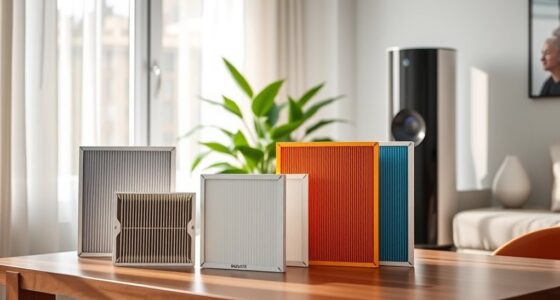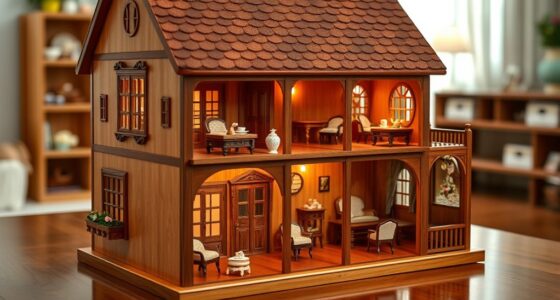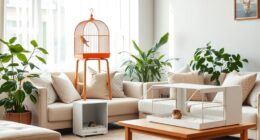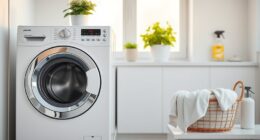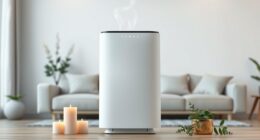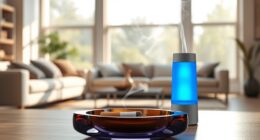Were you aware that the air inside your home could be up to five times more contaminated than the air outside? This is precisely why it’s essential to purchase a quality air purifier for your household.
In this article, I’ll guide you through the key factors to consider when choosing an air purifier. From filter efficiency and air purification technology to coverage area and noise level, we’ll cover everything you need to know.
So let’s dive in and make sure you find the perfect air purifier for your needs.
Key Takeaways
- Filter efficiency and regular maintenance are crucial for optimal air purification performance.
- The effectiveness of an air purifier depends on the technology it utilizes, such as HEPA filters, activated carbon filters, UV light technology, and ionizers.
- Consider the coverage area and portability of the air purifier, choosing one that aligns with the room size and your mobility needs.
- Consider the noise level, energy consumption, additional features, price range, brand reputation, warranty, and customer support when selecting an air purifier.
Filter Efficiency
When choosing an air purifier, it’s important to consider the filter efficiency. The filter is the heart of an air purifier and is responsible for trapping and removing pollutants from the air. A high filter efficiency means that more contaminants are captured, resulting in cleaner air.
Regular air purifier maintenance is essential to ensure optimal filter efficiency. This includes cleaning or replacing the filter as recommended by the manufacturer. Neglecting maintenance can lead to a decrease in filter efficiency and compromise the performance of the air purifier.
Additionally, the filter’s lifespan is an important factor to consider. A longer filter lifespan means less frequent replacements and lower maintenance costs.
Therefore, when choosing an air purifier, it’s crucial to prioritize filter efficiency, maintenance, and lifespan for the best air purification performance.
Air Purification Technology
One important thing to consider is the type of technology used in an air purifier. The effectiveness of an air purifier largely depends on the technology it utilizes.
There are various types of air purification technologies available in the market, each with its own advantages and limitations. The most common types include HEPA (High-Efficiency Particulate Air) filters, activated carbon filters, UV light technology, and ionizers.
HEPA filters are highly effective at removing particles as small as 0.3 microns, while activated carbon filters excel at eliminating odors and chemicals. UV light technology can kill bacteria and viruses, and ionizers work by releasing negatively charged ions to attract and neutralize airborne pollutants.
It is important to consider the maintenance requirements of each technology to ensure the longevity and efficiency of the air purifier. Regular filter replacement and cleaning are crucial for optimal performance.
Coverage Area
To determine which air purifier is best for your needs, consider the coverage area it is designed for and make sure it aligns with the size of the room you want to purify. A larger room will require an air purifier with a higher coverage area, while a smaller room can be adequately served by a purifier with a lower coverage area.
Additionally, it is important to consider the portability of the air purifier. If you plan on moving it from room to room, a lightweight and compact design would be ideal. On the other hand, if you intend to keep it in one room, a larger and more powerful purifier may be suitable.
Ultimately, the size and portability of the air purifier will greatly impact its effectiveness in purifying the air in your home.
Noise Level
When it comes to choosing an air purifier, one important factor to consider is the noise level. Quiet operation is crucial for those who want to use the device in a bedroom or office without being disturbed.
To address this, many air purifiers are equipped with noise reduction features such as whisper-quiet modes or sound-dampening technology to ensure a peaceful environment while still effectively purifying the air.
Quiet Operation Importance
You’ll want to prioritize a quiet operation when choosing an air purifier. Not only does a quiet air purifier allow for a more peaceful environment, but it also ensures that you can use it without disturbing your sleep or daily activities.
When considering the noise level of an air purifier, here are some key factors to keep in mind:
- Soundproofing options: Look for air purifiers that come with soundproofing materials or features to minimize noise transmission.
- Sleep-friendly design: Opt for air purifiers specifically designed for bedrooms, with low noise levels to promote uninterrupted sleep.
- Noise reduction technology: Choose air purifiers equipped with advanced noise reduction technology for a quieter operation.
- Variable speed settings: Select air purifiers with adjustable fan speeds, allowing you to customize the noise level to your preference.
- Quiet mode: Some air purifiers have a dedicated quiet mode setting, which significantly reduces noise output for a peaceful environment.
Considering these factors will help you find an air purifier that not only effectively cleans the air but also operates quietly, enhancing your overall comfort and well-being.
Moving on to the next section, let’s explore some specific noise reduction features to consider.
Noise Reduction Features
Consider prioritizing air purifiers with noise reduction features to create a quieter environment in your home. When searching for an air purifier, it is important to find one that not only effectively removes pollutants from the air but also operates silently. A silent operation ensures that you can enjoy cleaner air without any disturbance. Look for air purifiers with soundproof designs that minimize noise levels, allowing you to sleep peacefully or work in a quiet atmosphere. To help you in your search, here is a table outlining some popular air purifiers with noise reduction features:
| Air Purifier Model | Noise Level (dB) | Features |
|---|---|---|
| Model A | 30 dB | Soundproof design, silent operation |
| Model B | 25 dB | Whisper-quiet fan, noise reduction technology |
| Model C | 35 dB | Noise-canceling feature, low-noise motor |
| Model D | 28 dB | Silent mode, sleep-friendly operation |
| Model E | 32 dB | Noise-reducing filters, quiet fan speed |
Energy Consumption
When it comes to air purifiers, energy efficiency is an important factor to consider. Opting for energy-efficient models can help reduce your carbon footprint and save on electricity bills.
Look for air purifiers with low power consumption to ensure you’re making an environmentally conscious and cost-effective choice.
Energy-Efficient Models
To save on electricity costs, look for air purifiers with energy-efficient ratings. These models are designed to use energy-saving technology and sustainable design principles, making them more environmentally friendly and cost-effective in the long run. When searching for an energy-efficient air purifier, keep in mind the following factors:
- Energy Star Certification: Look for the Energy Star label, which ensures that the purifier meets strict energy efficiency guidelines.
- Adjustable Fan Speeds: Opt for models with adjustable fan speeds, allowing you to customize the airflow and energy consumption according to your needs.
- Timer Function: A built-in timer allows you to set specific operating hours, helping you conserve energy when the purifier is not needed.
- Sleep Mode: Look for air purifiers with a sleep mode, which reduces noise levels and energy consumption during nighttime operation.
- Auto Shut-Off: Some models have an auto shut-off feature that turns off the purifier when the air quality is good, saving energy and extending the lifespan of the unit.
By selecting an energy-efficient air purifier, you can enjoy cleaner air while minimizing your electricity usage and reducing your carbon footprint.
Now, let’s move on to the next section about low power consumption.
Low Power Consumption
If you want to minimize your electricity usage, opt for an air purifier with low power consumption. When it comes to energy-saving technology, power efficiency is a key factor to consider.
Air purifiers with low power consumption are designed to use less energy while still effectively purifying the air in your home. This means you can enjoy cleaner air without worrying about high energy bills.
Look for air purifiers with energy-saving features such as programmable timers and sleep modes, which allow you to set specific operating times or reduce power consumption during certain hours. Additionally, choose models with energy star ratings, as they are certified to meet strict energy efficiency guidelines.
Filter Replacement Frequency
You should regularly check the filter replacement frequency of your air purifier. This is important to ensure that your air purifier is working efficiently and effectively. Here are some key points to consider when it comes to the filter replacement frequency:
-
Longevity of filters: Look for air purifiers that have filters with a long lifespan. This will help you save on the cost of filter replacements in the long run.
-
Cost of filter replacements: Consider the cost of replacing the filters for your air purifier. Some filters can be quite expensive, so it’s important to factor in this cost when making your purchase.
-
Manufacturer recommendations: Follow the manufacturer’s recommendations for filter replacement frequency. They know their product best and can provide guidance on when to replace the filters.
-
Air quality in your area: If you live in an area with high pollution or allergens, you may need to replace the filters more frequently.
-
Filter replacement indicators: Look for air purifiers that have filter replacement indicators. These indicators will notify you when it’s time to replace the filters, taking the guesswork out of the equation.
Considering these factors will help you choose an air purifier that not only meets your needs but also ensures the longevity of your filters and minimizes the cost of filter replacements. Now, let’s move on to discussing the additional features to look for in a good air purifier.
Additional Features
Now, let’s explore some additional features that can enhance the functionality of your air purifier.
One of the most exciting advancements in air purifier technology is the integration of smart technology. With smart features, you can control and monitor your air purifier remotely using your smartphone or other smart devices. This allows you to adjust settings, schedule cleanings, and receive real-time air quality updates, all from the convenience of your phone.
Some air purifiers even have smart sensors that automatically detect and adjust the fan speed based on the air quality in your home.
Another useful feature to look for is a sleep mode, which operates the purifier quietly and with minimal light, ensuring a peaceful night’s sleep.
Other additional features may include a timer function, child lock, and even voice control compatibility.
With these additional features, your air purifier can become a powerful tool in maintaining clean and healthy indoor air.
Price Range
Now that we’ve explored the additional features that air purifiers can offer, let’s talk about an important factor for many people when choosing a good air purifier: the price range.
When considering the cost effectiveness of an air purifier, it’s important to find budget-friendly options that still provide efficient air cleaning. Here are some key points to keep in mind:
- Look for air purifiers that offer a range of price options to fit your budget.
- Consider the long-term costs of maintaining the air purifier, such as filter replacements.
- Research the energy efficiency of different models to ensure you’re not spending more on electricity bills.
- Compare the effectiveness of different air purifiers at removing pollutants to determine the best value for your money.
- Read customer reviews and ratings to get an idea of the overall cost effectiveness of a particular air purifier.
Considering the price range is crucial in finding a good air purifier that meets both your needs and your budget.
Now, let’s move on to another important aspect to consider: brand reputation.
Brand Reputation
When it comes to making a purchase, whether it’s a small household item or a big-ticket item like an air purifier, it’s important to consider the brand’s reputation. Trustworthy brand reviews can provide valuable insights into the quality and reliability of a product.
Similarly, reliable customer feedback can help to gauge the overall satisfaction and performance of the air purifier, giving you confidence in your purchasing decision.
Trustworthy Brand Reviews
If you’re looking for trustworthy brand reviews, it’s important to consider customer feedback and expert opinions.
When researching air purifiers, there are several reliable sources you can turn to for unbiased reviews and ratings. Here are some key factors to look for in trustworthy review sources:
-
Customer Feedback: Genuine user ratings and testimonials provide valuable insights into the performance and reliability of a brand and its products.
-
Expert Opinions: Reviews from reputable experts in the field can offer in-depth analysis and comparisons between different brands and models.
-
Independent Testing: Look for reviews that mention independent testing conducted by trusted organizations to ensure accuracy and reliability.
-
Transparency: Trustworthy review sources should disclose any potential conflicts of interest or sponsorships to maintain their credibility.
-
Consistency: Reputable review sources should demonstrate consistency in their evaluations, providing reliable and consistent information.
Reliable Customer Feedback
To make sure you’re getting reliable feedback, check for genuine user ratings and testimonials from trusted sources. When it comes to purchasing an air purifier, reliability analysis and user satisfaction are crucial factors to consider.
Reliable customer feedback provides valuable insights into the performance, durability, and overall effectiveness of the product. Look for ratings and testimonials from reputable websites or consumer review platforms. These platforms often conduct thorough reliability analysis, ensuring that the feedback is accurate and unbiased.
User satisfaction is another key aspect to consider. Positive reviews and high ratings indicate that the air purifier has met the expectations of its users and has effectively improved their indoor air quality.
What Features Should I Consider When Choosing an Air Purifier for a Small Space like a Dorm Room?
When choosing the best air purifiers for dorm room, consider the size of the space, the air purifier’s filtration system, noise level, and energy efficiency. Look for a compact design and easy-to-use controls for convenience in small spaces. A HEPA filter is recommended for capturing small particles and allergens.
Warranty and Customer Support
A good air purifier should have a warranty and reliable customer support. Having a warranty ensures that you are protected in case of any defects or malfunctions with the device. It gives you peace of mind knowing that the manufacturer stands behind their product.
Reliable customer support is also crucial as it allows you to easily reach out for assistance and get your queries or concerns addressed promptly. When considering an air purifier, it is important to look for a few key factors that contribute to customer satisfaction. These include:
- Extended warranty options: Some manufacturers offer the option to extend the warranty period, providing you with added protection and reassurance.
- Responsive customer support: Look for a company that has a reputation for providing excellent customer service and quick response times.
- Knowledgeable support staff: It is essential to have access to knowledgeable and well-trained support staff who can guide you through any troubleshooting or technical issues.
- Easy warranty claim process: A good air purifier should have a straightforward and hassle-free warranty claim process, making it convenient for you to get any necessary repairs or replacements.
- Positive customer reviews: Take the time to research and read customer reviews to get an idea of their experiences with warranty and customer support. This can give you valuable insights into the reliability and effectiveness of the air purifier you are considering.
Considering these factors will help ensure that you choose an air purifier with a warranty and customer support that meet your needs and provide you with the peace of mind you deserve.
Frequently Asked Questions
Are There Any Specific Air Purifiers Recommended for People With Allergies or Respiratory Conditions?
For people with allergies or respiratory conditions, specific air purifiers can be highly beneficial. These purifiers are designed to remove allergens, pollutants, and irritants from the air, helping to improve indoor air quality and alleviate symptoms.
Can Air Purifiers Remove Pet Dander and Pet Odors From the Indoor Air?
Can air purifiers effectively remove pet dander and pet odors? Pet hair removal is crucial for those with allergies or respiratory conditions. Look for air purifiers with HEPA filters and activated carbon to tackle these issues.
How Often Do Air Purifiers Need to Be Cleaned or Maintained?
I clean and maintain my air purifier regularly to ensure it works effectively. It’s important to follow an air purifier maintenance schedule and watch for signs of a dirty filter or reduced performance.
Can Air Purifiers Eliminate Viruses and Bacteria From the Air?
Yes, air purifiers can eliminate viruses and bacteria from the air. They are effective at removing airborne contaminants, including mold and mildew. As for electricity usage, some models are energy-efficient, but it’s best to check the specifications.
Are There Any Air Purifiers That Can Be Controlled Remotely Through a Smartphone App?
Yes, there are air purifiers that can be controlled remotely through a smartphone app. This feature allows for convenient control and monitoring, providing ease of use and the ability to manage the air purification system from anywhere.
Conclusion
Well, now you know what to look for in a good air purifier. Who knew cleaning the air could be so complicated? But fear not, armed with the knowledge of filter efficiency, air purification technology, coverage area, noise level, energy consumption, additional features, price range, brand reputation, and warranty and customer support, you can confidently navigate the world of air purifiers.
So go forth, my friend, and breathe in that fresh, purified air. Just don’t forget to schedule a weekly dusting session for your air purifier itself.
Happy breathing!
